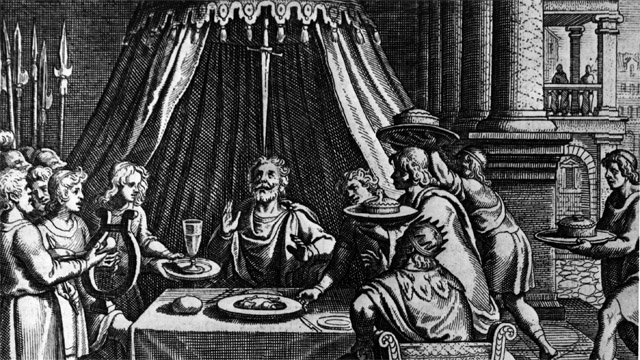K
ing Dionysius was a man of great power, fortune, and responsibility. To the outsider, he personified magnificence. A young and envious courtier, Damocles, was enthralled by everything he saw in the great king. On one festive occasion, Damocles was again praising the greatness of Dionysius and his fortune.
This time, Dionysius was tired of the pretty picture that Damocles always painted of his easy and fortunate life as king. He offered to switch places with Damocles for the day. Damocles of course jumped at the chance. Sitting on the king’s throne, Damocles was surrounded by every luxury. He ate, drank, and laughed the night away.
What he didn’t notice was the huge sword that hung above the throne, being kept in place by a single hair from a horses tail, that was tied to its pommel.
The night continued with Damocles none the wiser. At the end of the festivities, Dionysius asked if Damocles would like to continue playing the role of king.
Damocles replied, “Of course! It is such a pleasure and joy to experience such a carefree, decadent life.” It was then that Dionysius gestured to Damocles to look above him.
The moment he realized what he was looking at, Damocles was aghast and leapt out of the throne. Astonished by the massive sword so delicately balanced above his head, Damocles demanded to know what its meaning was.
Dionysisus calmly assumed his position on the throne and quietly spoke, “Power is married to great responsibility. You must be willing to face such dangers to be so lucky.” Damocles never asked to sit in the throne again.
S
torytelling is celebrated in our culture. From movies and TV shows to books and video games, stories are the common thread. We all love a good story.
But what about the stories we tell ourselves? The ones that are supposed to be based in fact, not fiction (though this isn’t always the case). The ones we share with friends and family, on social media and news outlets. These stories are different. They miss details and balance and sometimes even truth.
The tale above is known as The Sword of Damocles and is a great allusion to the ever-present challenges faced by those in positions of power. What I love about this story is how it truly shows both sides of the coin, the good that balances the bad; the pros and cons.
It is this balance that often gets lost in translation in our own stories. There’s a natural layer of distortion or abstraction that often occurs. The story of the media darling, who simply succeeded because he or she was in the right place at the right time. The genius entrepreneur who can do no wrong. The problem is, these stories are hardly ever the entire truth.
It can happen for many reasons. It may be as innocent as mis-remembering, thinking all the long hours of work were actually manifest in a simple moment of inspiration. Or it can be an active choice, trying to create a self-image that fits a particular narrative.
Somehow, we leave out the parts where we failed repeatedly, where we were severely depressed, where we hated everything we did, where we were filled with thoughts of self-doubt, and worse.
Who wants to hear about such things though? Wouldn’t we rather hear the fairy tale? What harm is there in leaving out the struggles? I feel there’s more harm than we let on. Abstracting our stories can be detrimental, both to ourselves and to others.
That’s easy, I could do that.
Have you ever been in an art gallery, looking at some famous piece of work, especially some of the more abstract, modern pieces, and thinking, I could do that, what’s the big deal.
I’ll admit it, I’ve certainly had this thought. Of course, it’s not so easy. It was Degas who said, “Painting is easy when you don’t know how, but very difficult when you do.” This is our ego rearing its ugly head. In today’s world we think we can do anything.
And in some ways this is true, if you truly commit to said thing, you can achieve it. The problem is, we start to believe we can do things immediately and with ease.
One reason for this inflated self belief are these exact abstracted stories. The stories of grand success and celebrity make things sound simple. If they can do it, so can we!
What’s so hard in creating a successful startup? Except that almost 90% of them fail. But that’s not what we see when we look at the cover of Wired magazine or read an article online by someone whose never done it before.
It’s not easy. We’re only getting half the story or maybe less and that allows us to give into our ego and believe things are easier than we realize. And when we ultimately fail, we wonder what went wrong.
Fear of missing out (FOMO).
Social media is brilliant. It’s literally a service that turns its users into the product. One of the biggest outcomes that is born from social media is that we always know what everyone else is doing.
Actually, that’s not quite right. What we really know is what everyone else wants us to know they are doing. And in that small distinction, we have the phenomenon that is FOMO. The stories we find online are often carefully crafted and curated to give the absolute best representation of our lives. Of course it’s mostly bullshit, but that doesn’t change how we feel about it. As they say, comparison is the thief of joy.
This is the ultimate abstraction of our stories. Do you ever wonder what a person has to go through to get that perfect Instagram shot? Watching your food get cold or faking a pose, just so you can get the perfect image is something I’ll never understand. But forget about the content creator, what about the audience? They are being fed an unbalanced diet of highs that are largely absent of the dark and difficult lows. How do you deal with that? What can you do but feel inferior or helpless or envious? All things that distract you from reality.
But forget about the content creator, what about the audience? They are being fed an unbalanced diet of highs that are largely absent of the dark and difficult lows. How do you deal with that? What can you do but feel inferior or helpless or envious? All things that distract you from reality.
In the end, we’ll all become stories.Margaret Atwood
Whether its yourself or others, stories have a major impact on our lives, and consequently, our own stories will have an impact on others.
Stories are powerful. They inspire, they motivate, and they educate. The stories we believe shape who we become. I believe its important that we pay more attention to our stories.
Don’t fall in love with the fairy tales and manufactured personas. Be authentic, be real, and be careful about the stories you believe.
